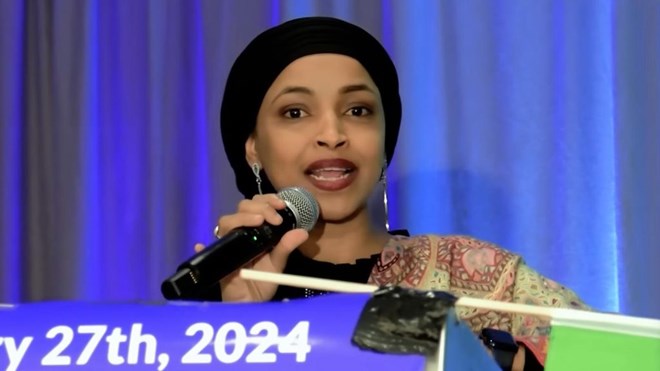
Tuesday January 30, 2024

Minneapolis (HOL) - Somali-American Congresswoman Ilhan Omar (D-MN) has found herself at the center of a controversy stemming from her recent comments about Somalia's territorial integrity and the role of the Somali diaspora in the United States. Critics have been quick to raise questions about her allegiance, but a closer examination reveals an intricate interplay of diaspora politics and Omar's role as a U.S. congresswoman.
Omar's remarks, initially seen as prioritizing Somali interests over American ones, have sparked intense discussion. However, supporters argue that her stance aligns with the broader American position on preserving sovereignty and territorial integrity, not just for Somalia, but as a fundamental principle of international relations.
Responding to the controversy, Omar remarked, "It's not only slanted but completely off, but I wouldn't expect more from these propagandists. I pray for them and for their sanity. No nation-state can survive if its states start to get involved in land lease negotiations with other countries without the consent of the federal government. Somalis in Somalia and in the diaspora are united in that effort, and I stand in solidarity with them. No amount of harassment and lies will ever change that."
Mubarak A. Isse, a strategic and policy researcher, underscores this, asserting that Omar's speech is in line with the U.S. stance on these issues. Similarly, Abdirashid Hashi, a researcher and Somalia analyst, points out that Omar's words have been unfairly expanded and distorted by those with ulterior motives. The controversy seems less about the substance of Omar's comments and more about the ongoing struggle to understand the role of diaspora politicians in American politics.
Omar's constituency in Minnesota includes a significant Somali-American population, a community that looks to her for representation and advocacy.
The controversy also touches on broader issues of representation and advocacy in American politics. As Professor Abdiwahab Sheikh Abdisamad, the executive director of the Institute for Horn of Africa Strategic Studies and an analyst at Southlink Consultants, notes, other ethnic groups in the U.S., such as Jewish-Americans, have long advocated for their countries of origin, a practice widely accepted in the American political landscape. Abdisamad believes that Omar's advocacy for Somalia, in this context, can be seen as part of this broader tradition of diaspora politics in the United States.
However, Omar's critics in Congress have adopted a markedly different perspective on her stance. Representative Mike Collins (R-GA) has been vocal in calling for her expulsion from Congress, declaring that her allegiance skews more towards Somalia than the United States. Omar's supporters interpret Collins's remarks as less about Omar's specific statements and more about broader trends of Islamophobia that periodically emerge in American political dialogue, especially from the right.